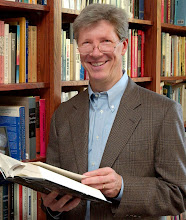My sermon yesterday was on Colossians 3, where Paul says “Set your minds
on things that are above, not on things that are on earth.” At first blush it
sounds like we should focus on “spiritual” things, not “earthly” things – like
politics. But in the Bible, “spiritual things” are the things pleasing to God,
whatever is motivated by and in sync with God’s Spirit. We could say God
“above” has a holy agenda for us down here; as we pray constantly, “Thy will be
done on earth as it is in heaven.”
In Colossians 3, “earthly
things” seem to be primarily about how we think and live; Paul explains: “Put
away the earthly – covetousness, evil desire, passion, anger, malice, slander,
foul talk… and do not lie to one another.” You might read this and think “Tell
Hillary!” or “Tell Trump!” But I say to you, “Tell James, tell yourself.”
Politics breeds anger, evil desire, foul talk and falsehood – among
politicians, but also in your own soul. You feel it already.
What is the Christian to do?
Just turn it off and pay no attention? For me, the best and holiest plan for
this and every political season is threefold. First, you just have to pay
attention to what’s unfolding, for the stakes could not be higher. God has a
rooting interest, because we could wind up with a world at war, or devastating
poverty, or an ever more vapid, self-indulgent, rancorous culture, and thus
less holiness, less goodness, and the church risks plummeting into more
irrelevance. Be very sure: God cares.
Secondly, be very attentive to
the state of your soul. When are you veering into a shrill, dark mood – even if
you’re sure you’re right? What pushes
your buttons, and why? Can you take time to breathe, to read Scripture, to be
at peace, to strive for a holy wisdom? We’ll say more about this.
Thirdly, can you sort through
all the agendas being pushed on us and figure out which way is God’s way? It’s
complicated, because it most assuredly isn’t the case that God loves the whole
Republican agenda and loathes the other guys – or vice versa. There are causes
and purposes that very clearly are of God. Mind you, we may not get on the same
page regarding how to pursue holy ends. But there still are holy ends. We will
try to examine some of them…
…because the grave peril Paul
speaks of in Colossians 3 is “idolatry.” Idolatry isn’t physically bowing down
to a statue. Idolatry is when we worship, adore, pursue, crave and even vote
for something that is not of God. This is hard – because for every one of us,
God is asking us during this season to realize what is in us that is not of
God, and then to repent, to give it up, to get in sync with God’s way. In fact,
the political season is God’s best opportunity to help us realize Oh my gosh,
I’ve been attached to this way or thinking, or to this agenda, or to this other
passion, and it’s not what’s in God’s heart. I want to love what God loves.
So stay with me! By election
day, we might just be a bit holier, a bit more at peace, and God’s church might
even hear a new calling to be God’s hands in a broken world.












